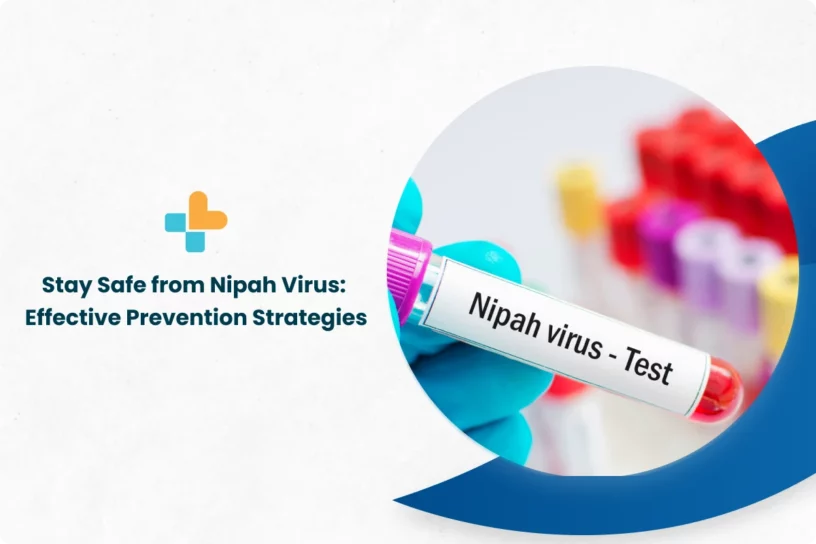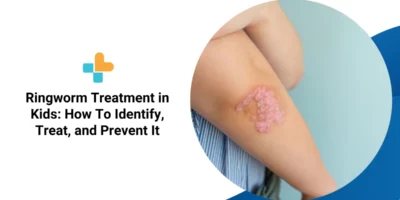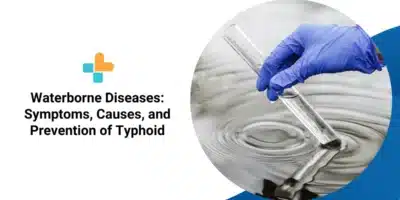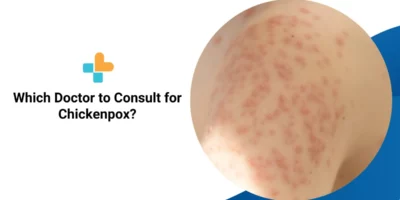Nipah virus is a highly infectious disease that can cause severe respiratory and neurological symptoms, with a mortality rate of up to 75%. The virus is primarily transmitted through contact with infected animals or by consuming contaminated food. While outbreaks of the Nipah virus are rare, they can be devastating when they do occur. To stay safe from the Nipah virus, it is essential to understand the transmission and symptoms of the disease and take appropriate preventive measures.
In this blog, we will discuss some effective prevention strategies to help you protect yourself and your loved ones from this deadly virus.
What is Nipah Virus?
Nipah virus is a zoonotic virus first identified in Malaysia in 1998. It is primarily transmitted to humans from animals such as bats, pigs, and horses. The virus can cause a range of symptoms, including fever, headache, dizziness, and respiratory illness, which can progress to severe neurological symptoms such as seizures and coma. The mortality rate of the Nipah virus can be as high as 75%, making it a serious public health concern.
Outbreaks of the Nipah virus have been reported in several countries in Southeast Asia, including Malaysia, Singapore, and Bangladesh, as well as in India. Currently, there is no specific treatment for the Nipah virus, and prevention measures are crucial to controlling the spread of the disease.
Transmission
The Nipah virus is primarily transmitted through close contact with infected animals, particularly fruit bats, or through the consumption of food contaminated by infected animal secretions (urine, saliva, and excreta). The virus can also spread from person to person through direct contact with bodily fluids of infected individuals such as saliva, respiratory droplets, urine, or blood, or through close contact with objects contaminated with these fluids.
In some instances, human-to-human transmission has been reported in the context of close contact with patients in healthcare settings. It is important to note that the virus is not airborne, and a person cannot get infected by simply being in the same room as an infected individual. However, the virus is highly infectious, and even a small amount of exposure to infected bodily fluids can lead to infection. Thus, it is crucial to take appropriate precautions to avoid exposure to the virus.
Signs and Symptoms
The symptoms of the Nipah virus can range from mild to severe and typically appear within 5 to 14 days after exposure to the virus. The initial symptoms are similar to those of other viral illnesses and may include fever, headache, muscle pain, vomiting, and sore throat. Some patients may also experience dizziness, disorientation, and confusion.
In severe cases, the Nipah virus can cause acute respiratory distress syndrome (ARDS) and encephalitis (inflammation of the brain). Patients may develop seizures, convulsions, and loss of consciousness. The mortality rate of the Nipah virus can be as high as 75%, and those who survive may experience long-term neurological consequences such as persistent seizures and personality changes.
It is essential to seek medical attention immediately if you develop any symptoms of Nipah virus, especially if you have had contact with infected animals or individuals. Early diagnosis and treatment can significantly improve the chances of survival and reduce the risk of transmission to others.
Diagnosis
The diagnosis of Nipah virus infection is typically made through laboratory tests, including polymerase chain reaction (PCR) and enzyme-linked immunosorbent assay (ELISA). Samples of blood, urine, and respiratory secretions are collected and tested for the presence of the virus.
It is essential to inform healthcare professionals if you have had contact with infected animals or individuals, as this information can help with early diagnosis and appropriate management of the disease. Rapid diagnosis and prompt initiation of supportive treatment are critical for improving outcomes and reducing the risk of transmission to others.
Treatment
Currently, there is no specific antiviral treatment available for Nipah virus infection. Treatment is primarily supportive and focuses on managing symptoms and complications such as respiratory distress, encephalitis, and seizures. Patients may require hospitalization and supportive care such as oxygen therapy, mechanical ventilation, and anticonvulsants.
Experimental treatments such as ribavirin and monoclonal antibodies have shown some promise in animal models and in limited human studies, but further research is needed to determine their efficacy in treating Nipah virus infection.
Prevention measures such as avoiding contact with infected animals and individuals, practicing good hygiene such as frequent hand washing, and using personal protective equipment (PPE) are critical for preventing the spread of the disease. Vaccines are currently under development, but none are available for human use at this time.
Also Read : The symptoms and risk factors of viral fever
Prevention
Prevention measures are crucial for avoiding Nipah virus infection. Here are some key strategies to prevent the spread of the disease:
- Avoid contact with infected animals, especially bats, pigs, and horses.
- Do not consume fruits or other food items contaminated with animal secretions.
- Practice good hygiene, including frequent hand washing with soap and water or alcohol-based hand sanitizer.
- Wear personal protective equipment (PPE), such as gloves, masks, and goggles, when in contact with infected individuals or contaminated materials.
- Avoid close contact with individuals who are showing symptoms of the disease.
- Healthcare professionals should use appropriate infection control measures to prevent the spread of the disease in healthcare settings.
- Stay informed about the latest developments related to Nipah virus outbreaks in your area and follow the guidelines issued by public health authorities.
Conclusion
In conclusion, the Nipah virus is a serious and potentially life-threatening disease that can be transmitted from animals to humans and from person to person. While there is no specific treatment for the disease, prevention measures such as avoiding contact with infected animals, practicing good hygiene, and wearing personal protective equipment can help reduce the risk of infection.
If you develop symptoms of the Nipah virus, seek medical attention immediately. Early diagnosis and supportive care can improve outcomes and reduce the risk of transmission to others.
At Ayu Health, we understand the importance of timely medical intervention and offer a range of healthcare services, including teleconsultations with experienced doctors, medical advice, and assistance in finding suitable medical facilities for treatment.
Contact Ayu Health for any medical queries or assistance, and we will be happy to assist you.
Our Hospital Locations
General Surgery Hospitals in Chandigarh | General Surgery Hospitals in Bangalore | General Surgery Hospitals in Jaipur | General Surgery Hospitals in NCR | General Surgery Hospitals in Hyderabad
Our Doctors
General Surgery Doctors in Chandigarh | General Surgery Doctors in Bangalore | General Surgery Doctors in Jaipur | General Surgery Doctors in NCR | General Surgery Doctors in Hyderabad
About the Author

Dr. S. Goel
Dr. S. Goel is a renowned Internal Medicine Specialist currently practicing at Ayu Health, Bangalore. He is a Specialist in Internal Medicine, Diabetes HTN, Paediatric Care, and Family Medicine.




